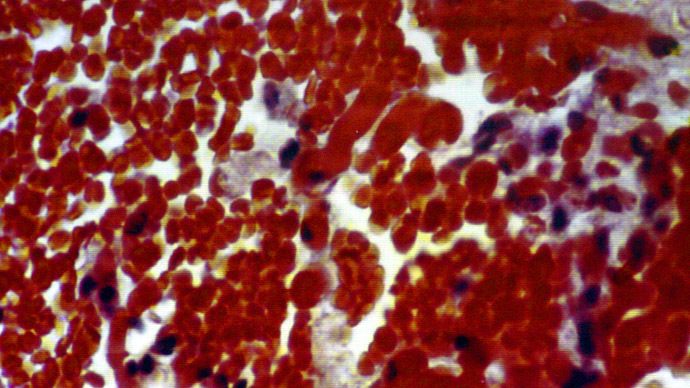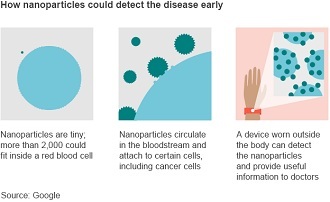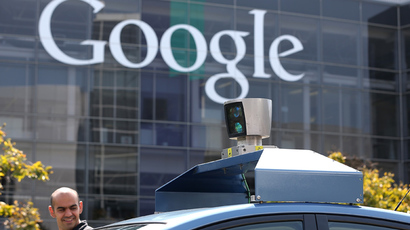Google nanobots: Early warning system for cancer, heart disease inside the body

Google wants your body to host a search engine, using a pill to diagnose health issues like cancer or heart disease. The nanoparticles inside would travel through the bloodstream and send their findings back to an exterior sensor.
The project, run by the company’s secretive Google X research and development division, is still in its infancy, the Associated Press reported. The technology ‒ which would be less than one-thousandth the width of a red blood cell ‒ would use disease-detecting nanoparticles, ingested via a pill, that send data back to a sensor on a wristband.
The internet behemoth hopes that the pills will be able to identify minute changes in body chemistry and act as an early warning system for diseases like cancer. Some cancers, such as pancreatic and ovarian, are usually detected only after it is too late for treatments to work, and thus are highly fatal.

Dr. Andrew Conrad, the molecular biologist who created a cost-effective HIV test that is widely used in blood-plasma donations, is heading up the latest Google X medical project.
"What we are trying to do is change medicine from reactive and transactional to proactive and preventative," he told the BBC. "Nanoparticles... give you the ability to explore the body at a molecular and cellular level."
"We want to make it simple and automatic and not invasive," he said to AP.
The pills wouldn’t just be able to seek malignant cells. Different sets of nanoparticles would look for different diseases or markers. One set might look for evidence of atherosclerosis ‒ a hardening of blood vessels due to fatty plaques that can lead to a heart attack or stroke. Another could monitor chemicals in the blood, like high levels of potassium, which is linked to kidney disease. Google is trying to create porous, magnetic nanoparticles that would alter the offending cell, protein or chemical and could later be recalled, the BBC reported.
"Then [you can] recall those nanoparticles to a single location - because they are magnetic - and that location is the superficial vasculature of the wrist, [where] you can ask them what they saw," said Dr. Conrad.
Andrew Conrad revealing nanoparticle platform from Google. A pill & wearable gets blood work to your doc! #WSJDLivepic.twitter.com/vs2PxtRqSG
— Nayan Naik (@nayan) October 28, 2014
The molecular biologist revealed the project Tuesday at the Wall Street Journal’s WSJD Live conference. “Every test you ever go to the doctor for will be done through this system,” he said. “That’s our dream.”
The dream is at least five to seven years away, according to the Next Web. Researchers still need to identify coatings to help the particles bind to the specific kind of cell, protein, chemical, etc. And Google has no idea how many nanoparticles would be needed in each pill, or whether it would vary by its intent. The size of the delivery device has yet to be determined as well: The wearable device needs to be small enough to be unobtrusive, yet contain a battery that doesn’t need frequent recharging, the WSJ reported.
Google X would still need to pass government hurdles as well. And a pill full of nanoparticles would face “a much higher regulatory bar than conventional diagnostic tools,” Chad A. Mirkin, director of the International Institute for Nanotechnology at Northwestern University and a founder of three medical nanotechnology companies, told the WSJ.
Privacy is also a concern, with Google’s main businesses profiting off users’ data, as well as consumers’ fears of hacking. But Conrad sought to downplay the unease that the internet giant’s R&D division would treat the human body as a search engine.
Google X is making nanoparticles that go inside your body and find cancer http://t.co/llCWpTqC9Xpic.twitter.com/GYG7xtQHr6
— Pocketlint (@Pocketlint) October 28, 2014
"We are the inventors of the technology but we have no intentions of commercialising it or monetising it in that way," he told BBC News. "We will license it out and the partners will take it forward to doctors and patients.”
"These are not consumer devices. They are prescriptive medical devices, and you know that doctor-patient relationships are pretty privileged and would not involve Google in any way," he added.
Even if a pill with diagnostic nanoparticles is a pipe dream, it’s still one that is welcomed by the medical industry.
"There is an urgent need for this. If we can detect cancer or other diseases earlier, then we can intervene with either lifestyle changes or treatment,” Professor Paul Workman, chief executive of the Institute of Cancer Research in London, told the BBC News website. "How much of this proposal is dream versus reality is impossible to tell because it is a fascinating concept that now needs to be converted to practice."
Google made the project public to find investors and partnerships to further develop ‒ and eventually license out ‒ the technology.














